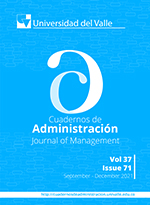Case Analysis: Financial viability for the commercialization of physicochemical testing services at the Antioquia Liquor and Alcohol Factory (ALAF)
Keywords:
Financial viability, Commercialization, Physicochemical testing services, Liquor industry, Business transformationMain Article Content
The purpose of this work is to evaluate the profitability of the market for physicochemical testing of alcoholic beverages, which the Physicochemical Laboratory of the Liquor de Antioquia Factory (FLA) intends to enter, according to the transformation in its legal nature. The methodology that includes the costing of the tests using cost accounting and the analytical procedures used by the laboratory. For the construction of the cash flow of the project for the sale of the physicochemical tests, it was necessary to search and consolidate information concerning the inventory of fixed assets of the laboratory and the entry of annual samples from the different areas of the FLA. The AutoRegressive Moving Average (ARMA) model is used as the demand projection method. The results reveal that, although restricted and specialized, the physicochemical testing market may generate, under certain scenarios, a return on investment that allows the self-sustainability, viability and competitiveness of the physicochemical laboratory over time.
Arango, A. (2018). Estrategias para la Industria Licorera de Caldas a partir de la recomposición del mercado de licores en Colombia. [EAFIT]. https://repository.eafit.edu.co/handle/10784/76
Acuerdo 0422. [Concejo de Santiago de Cali]. Por el cual se adopta la Política pública municipal de educación ambiental de Santiago de Cali 2017-2036. Septiembre 27, 2017. Boletín Oficial 140. http://www.concejodecali.gov.co/descargar.php?idFile=16615
Baca Urbina G. (2013). Evaluación de Proyectos (4ta edi). Mc. Graw Hill. https://econforesyproyec.files.wordpress.com/2014/11/evaluacion-de-proyectos-gabriel-baca-urbina-corregido.pdf
Balyeat, B. & Cagle, J. (2015). MIRR: The Means to an End? Reinforcing Optimal Investment Decisions Using the NPV Rule. Journal of Financial Education, 41(1), 90-103. url: http://www.exhibit.xavier.edu/finance_faculty
Carbonel, J. (2016). Formulacion y Evaluacion de Proyectos de Inversion. Macro EIRL. https://pdfcoffee.com/qdownload/formulacion-y-evaluacion-de-proyectos-de-inversion-juan-carbonel-valdivia-librosvirtualcompdf-pdf-free.html
Gómez-Restrepo, J., Uribe, J. D., y Vargas-Herrera, H. (2017). La implementación del régimen de meta de inflación en Colombia. En A. E. Meisel-Roca, M. T. Ramírez-Giraldo, Tres Banqueros Centrales. http://repositorio.banrep.gov.co/handle/20.500.12134/7184
Laitinen, E. K. (2018). Financial Reporting: Long-Term Change of Financial Ratios. American Journal of Industrial and Business Management, 8(9), 1893-1927. https://doi.org/10.4236/ajibm.2018.89128
Naturaleza jurídica de la Fábrica de Licores y Alcoholes de Antioquia [Sentencia Consejo de Estado]. Radicación número: 05001-23-31-000-2006-93419-01 de junio 21, 2018. https://www.consejodeestado.gov.co/documentos/boletines/214/05001-23-31-000-2006-93419-01.pdf
Osborne, M. J. (2010). A resolution to the NPV-IRR debate? Quarterly Review of Economics and Finance, 50(2), 234-239. https://doi.org/10.1016/j.qref.2010.01.002
Piraquive, G., Matamoros, M., Cespedes, E., y Rodríguez Chacón, J. (2018). Actualización de la tasa de rendimiento del capital en Colombia bajo la metodología de Harberger. Archivos de Economía, 487, 44. https://colaboracion.dnp.gov.co/CDT/Estudios%20Econmicos/487.pdf
Sainjargal, B., Naranchimeg, L., Khurelbaatar, B., & Chimedsuren, C. (2020). Financial Situation Analysis of Entities. Business, 12(01), 1-12. https://doi.org/10.4236/ib.2020.121001
Sapag, N., y Sapag, R. (2008). Preparacion y Evaluacion de Proyectos (2ª edi., Vol. 5, Issue 1). McGraw-Hill. http://www.utntyh.com/alumnos/wp-content/uploads/2013/03/Preparacion-Y-Evaluacion-De-Proyectos-Sapag-Sapag.pdf%0Ahttps://ejournal.poltektegal.ac.id/index.php/siklus/article/view/298%0Ahttp://repositorio.unan.edu.ni/2986/1/5624.pdf%0Ahttp://dx.doi.org/10.1
Vega Castro, B. I., y González Cerrud, P. (2014). Las técnicas financieras para la determinación de valor razonable, su aplicación en los estados financieros y las posibles repercusiones para las empresas. Fórum Empresarial, 19(2), 51-69. https://doi.org/10.33801/fe.v19i2.3933
Zapata, J. G. (2019). Insumos de Fedesarrollo para la asesoría sobre el análisis del mercado de licores en el departamento del Huila informe final investigadores principales. https://www.repository.fedesarrollo.org.co/handle/11445/3898
Downloads

This work is licensed under a Creative Commons Attribution-NonCommercial-NoDerivatives 4.0 International License.

